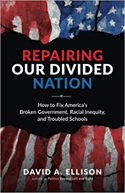
 |
Repairing Our Divided Nation: How to Fix America’s Broken Government, Racial Inequity, and Troubled Schools
by David A. Ellison
Cedarhurst Press
Few can argue that modern America faces problems stemming from partisanship in government and racial inequity in society. In his brief but well-defined treatise, the author discusses how the United States became a nation divided along party lines in both the private sector and government, why racism still has its hold on American society, and how the educational system can be used to help rectify these problems. The author pulls from many historical writings, such as U.S. Supreme Court decisions, The Federalist Papers, The Constitution of the United States, and authors from Frederick Douglass to M. Night Shyamalan to illustrate his points. The book includes Martin Luther King Jr.’s "Letter from Birmingham Jail," The Declaration of Independence, The Constitution of the United States, and the constitutional amendments.
Ellison begins with a history of the country’s founding, emphasizing the importance of the concept of natural rights to the founding fathers. These rights are “universal and precede anything that is a manmade law.” They are defined in The Declaration of Independence in the words of Thomas Jefferson: “all men are created equal, that they are endowed by their Creator with certain unalienable Rights, that among these are Life, Liberty, and the pursuit of Happiness.” Simply put, all are to be treated equally. Ellison does a good job of explaining what some might call the hypocrisy of the founders, some of whom owned slaves, in creating a document that failed to address the problem of slavery or abolish it in the new nation. Ellison goes on to discuss the great harm that was done during Reconstruction after the death of Lincoln and the inauguration of the racist Andrew Jackson. Lincoln’s plans to institute education programs, help provide training, and provide economic security were unfulfilled. Without these programs, the freed slaves were at the mercy of the states with no resources of their own to start lives as free people. Ellison continues with a discussion of the government’s move away from what was envisioned in the Constitution and presents a sobering look at the nation’s debt.
The author writes in a conversational manner, making the work easy to comprehend. Though the book is rather brief for such a weighty subject, each page holds a wealth of information. Ellison lays out the problem, tracks its source, and offers a solution in a tightly woven work that gives one food for thought. He is a self-proclaimed centrist, which he defines as “someone who likes some of the ideas from the Democratic side of the aisle and some from the Republican side. Centrists do not believe either party has a lock on all the good ideas to lead our country forward.” His is a refreshing take on how to tackle problems in Washington and the country as he deals with facts and doesn’t get bogged down in partisan politics, an unusual offering in today’s political writings. Not only does Ellison offer an intriguing argument, but his understanding of the historical implementations in the current situation of the country is also enlightening. Anyone looking for a good overview of the nation’s political history and a well-thought-out proposal for problem-solving within the government, society, and the educational system will find it here.
The added texts add to the enjoyment and understanding of Ellison’s writing and offer readers an opportunity to read one of history’s most moving works in “Letter from Birmingham Jail,” as well as get reacquainted or perhaps for the first time acquainted with The Declaration of Independence and The Constitution of the United States of America. As Ellison declares, “Now is the time to repair our divided nation.” He has given readers both the reason for such a divide and the way forward to bringing the nation together.
A 2022 Eric Hoffer Book Award Montaigne Medal Finalist
RECOMMENDED by the US Review